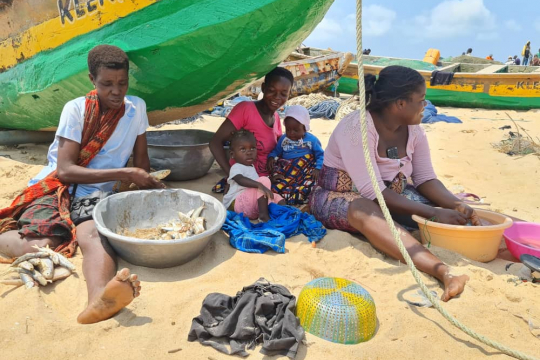EfD Ghana continues to attract a lot of attention in Ghana as a direct result of its work on environmental issues. The impact of the Center’s work, particularly in the fisheries sector, attracted the immediate attention of no mean person than Former President Jerry John Rawlings, who in 2020 invited EfD Ghana to hold discussions exploring areas he could collaborate with the Center to address pressing fisheries sector issues. While these plans could not be progressed due to President Rawlings’s untimely demise, EfD Ghana’s consistency in addressing fisheries issues continues to be noticed by other vital entities.
One such entity is the Fisheries Commission of Ghana, which invited EfD Ghana Director Prof. Wisdom Akpalu to participate in a high-level meeting in Ghana from 25 to 26 October 2021. The main objective of this meeting was to review the draft Fisheries Management Plan (2022 -2026) for Ghana. At the meeting, Prof. Akpalu tabled convincing research-based recommendations, including reducing the number of trawlers operating in the country’s waters. This triggered a discussion to set up a scientific committee to provide science-based advice to the Fisheries Commission.
While the reduced number of trawlers proposed by Prof. Akpalu was not reflected in the final report (despite being considered in the following draft), a Scientific and Technical Committee (STC) has been set up (as discussed at the high-level meeting), to act as an advisory panel, providing guidance on fisheries matters, of which Prof. Akpalu occupies the influential position of vice-chair.
As Prof. Akpalu said: “With so many competing voices and forces, the voice of research may not always be heard, but silence is not an option. We must continue to give voice to research and research expertise, and for EfD Ghana, a seat at the Scientific and Technical Committee of the Fisheries Commission of Ghana is a good place to make this voice heard.”
Speaking of research evidence and expertise, Prof. Akpalu has been commissioned by USAID (under its Ghana Fisheries Recovery Activity) to conduct a nationwide study on the socioeconomic impact of Ghana’s closed fishing season on fishing households. As part of the study, EfD Ghana will assess the socioeconomic impact of the recently closed season, from July 1 – 31 (The closed season is the period when all fishing activity is prohibited by law, to allow for fish stocks to replenish).
The assignment includes a training component involving relevant staff of the Fisheries Commission who Prof. Akpalu will train on how to conduct similar assessments. It is expected that the training will strengthen the capacity of trainees to incorporate, more effectively and efficiently, the use of research skills and techniques in their work – a beneficial outcome for the country’s fisheries sector.
Overall, EfD Ghana’s continued engagement with the Fisheries Commission and other key fisheries sector stakeholders is contributing to deepening the Center’s influence and visibility, which are key ingredients in building and sustaining impact.
Extending our impact beyond Ghana, a video documentary on Ghana’s fisheries sector featuring EfD Ghana has garnered more than 50,000 views on YouTube. The documentary, which sheds light on illegal fishing and its impact on Ghana’s population, prominently features Prof. Wisdom Akpalu in his capacity as the Director of EfD Ghana.
EfD-Ghana understands the power of strong, collaborative relationships – including with stakeholders in government and the media space – in producing and sustaining impact. The Center will, therefore, continue to actively develop and nurture these strategic relationships as avenues for conveying its research in and beyond Ghana.
